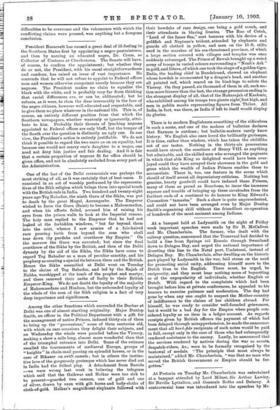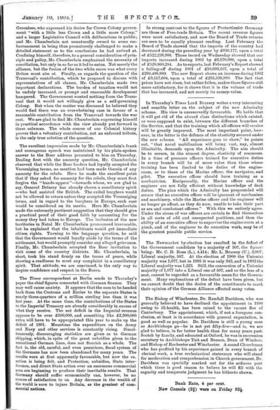At Pretoria on Tuesday Mr. Chamberlain was entertained at a
banquet attended by Lord Milner, Sir Arthur Lawley, Sir Neville Lyttelton, and Generals Botha and Delarey. A controversial tone was introduced into the speeches by Mr.
Greenlees, who expressed his desire for Crown Colony govern- ment "with a little less Crown and a little more Colony," and a larger Legislative Council with deliberations in public; and Mr. Chamberlain not unnaturally owned to some em- barrassment in being thus prematurely challenged to make a detailed statement as to the conclusions he had arrived at. Confining himself, therefore, to a general consideration of prin- ciple and policy, Mr. Chamberlain emphasised the necessity of conciliation, but only in so far as it led to union. Not merely the alliance, but the fusion of the two white races was what every Briton must aim at. Finally, as regards the question of the Transvaal's contribution, which he proposed to discuss with representatives of all classes, Mr. Chamberlain made two important declarations. The burden of taxation would not be unduly increased, or prompt and reasonable development hampered. The Government wanted nothing from the Trans- vaal that it would not willingly give as a self-governing Colony. But when the matter was discussed he believed they would find there was an overwhelming case in favour of a reasonable contribution from the Transvaal towards the war cost. We are glad to find Mr. Chamberlain expressing himself in practical accordance with the view already put forward in these columns. The whole course of our Colonial history proves that a voluntary contribution, not an enforced tribute, is the only true solution of the question.







































 Previous page
Previous page